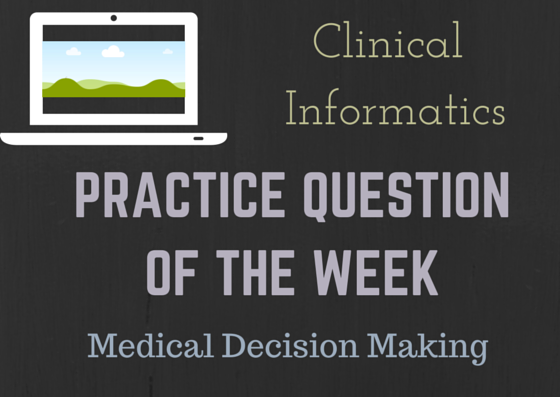In this week’s practice question, we cover decision making – or more specifically the nature and cognitive aspects of human decision making. Yes – this is a real section in the core content under “Clinical Decision Making and Care Process Improvement” and you will be tested on it.
So what exactly is the nature of human decision making and what are it’s cognitive aspects? We take it to mean that to err is human, but understanding that and knowing we’re susceptible to certain biases when making decisions will help us make better ones – both in medical situations and real-life ones.
Let’s get on to this week’s clinical informatics exam practice question.
Question:
A resident is nearing the end of their shift and is looking forward to a nice, long nap. A patient complaining of chest pain is their final patient of the day. The resident also took care of three other patients that day also presented with complaints of chest pain, but they were all determined to have benign causes. The resident is quick to assume that this patient too must have a benign cause for their pain. The resident’s assumption would be an example of:
A. Availability Bias
B. Confirmation Bias
C. Omission Bias
D. Visceral Bias
Explanation and Answer
Availability Bias: The tendency to base decisions based on our most recent, emotional, or unusual memories. There is also a tendency to be more likely to believe frequently told stories and anecdotes are what are happening.
Example: If the last ten people to walk into the ER with chest pains had benign causes, it does not mean that the eleventh person to walk in will also have a benign cause for their chest pain.
Outcome Bias: The tendency to judge decisions based on eventual outcome rather than the quality of the decision.
Example: Those who drink and drive may be outcome biased. Offenders typically have repeated the action eight times until they’re arrested. Just because you do not get caught does not make it a good decision.
Omission Bias: The tendency to avoid interventions that may have serious side effects or consequences. Those with omission bias may feel that harmful actions are worse than harmful omissions and therefore have a tendency towards inaction. The opposite of omission bias is commission bias.
Example: Failing to recommend therapy to late- stage cancer patients whose morbidity chances would increase due to surgery and radiation and whose treatment would not necessarily improve their well-being.
Visceral Bias: The tendency for emotions to influence our decisions for subsets of patients
Example: We may have a tendency to treat VIP patients or very difficult patients differently.
Confirmation Bias: The tendency to corroborate rather than refute.
Example: A fatigued or distracted physician receives a new patient from another ward and expects than the prior physician’s diagnosis was correct, despite obvious symptoms that disprove the diagnosis yet still heeds the prior physician’s diagnosis.
Additional Biases: premature closures (accepting a diagnosis too soon), representativeness restraint (it looks like a heart attack, so it must be a heart attack), overconfidence bias (we believe we know more than we do), and anchoring errors (holding on too long to an initial impression)
Therefore, the answer to this questions is A. Availability Bias.
If you’re looking for other study resources, check out some of our other practice questions of the week. You can also purchase our text – Clinical Informatics Board Review: Pass the Exam the First Time. It’s the only board review book for the clinical informatics exam. It also comes with a money back guarantee if you don’t pass the exam on your first attempt – the only study material for the clinical informatics exam with one.
References:
Cognitive Biases and Heuristics in Medical Decision Making: A Critical Review Using a Systematic Search Strategy. Blumenthal-Barby JS1, Krieger H2. http://www.ncbi.nlm.nih.gov/pubmed/25145577
Medical Cognitive Biases. Columbia University. http://www.columbia.edu/itc/hs/medical/cognitive_biases/
